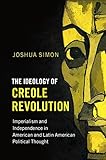The ideology of Creole revolution : imperialism and independence in American and Latin American political thought / Joshua Simon, Columbia University.
Material type: TextLanguage: English Series: Problems of international politicsPublication details: Cambridge ; New York : Cambridge University Press, 2017.Description: 276 p. ; 23cmISBN:
TextLanguage: English Series: Problems of international politicsPublication details: Cambridge ; New York : Cambridge University Press, 2017.Description: 276 p. ; 23cmISBN: - 9781107158474 (hard back : alk. paper)
- 9781316610961 (paper back : alk. paper)
- United States -- History -- Revolution, 1775-1783
- United States -- Politics and government -- 1775-1783
- Latin America -- History -- Autonomy and independence movements
- Latin America -- Politics and government -- 1806-1830
- Creoles -- United States -- History
- Creoles -- Latin America -- History
- Hamilton, Alexander, 1757-1804 -- Political and social views
- Bolívar, Simón, 1783-1830 -- Political and social views
- Alamáan, Lucas, 1792-1853 -- Political and social views
- Estados Unidos -- Historia -- Revolución, 1775-1783
- Estados Unidos -- Política y gobierno -- 1775-1783
- 973.3
- 002 E 210 S595i 2017
| Item type | Current library | Home library | Collection | Shelving location | Call number | Vol info | Copy number | Status | Date due | Barcode |
|---|---|---|---|---|---|---|---|---|---|---|
 Libro
Libro
|
Biblioteca Juan Bosch | Biblioteca Juan Bosch | Recursos Regionales | Recursos Regionales (2do. Piso) | 002 E 210 S595i 2017 (Browse shelf(Opens below)) | 1 | 1 | Available | 00000121539 |
Browsing Biblioteca Juan Bosch shelves, Shelving location: Recursos Regionales (2do. Piso), Collection: Recursos Regionales Close shelf browser (Hides shelf browser)

|

|

|

|

|

|

|
||
| 002 E 210 J54c 2000 The creation of America : through revolutiobns to empire / | 002 E 210 A832n 1995 El nacimiento de los Estados Unidos, 1763-1816 / | 002 E 210 D253p 1973 Propaganda and the American Revolution, 1763-1783 / | 002 E 210 S595i 2017 The ideology of Creole revolution : imperialism and independence in American and Latin American political thought / | 002 E 210 S631i 2014 Independence : the tangled roots of the American Revolution / | 002 E 211 P147g 2009 Glenn Beck's common sense : the case against an out-of-control government, inspired by Thomas Paine / | 002 E 215.7 Y68s 1999 The shoemaker and the tea party : memory and the American Revolution / |
Includes bibliographical references and index.
Introduction : the ideas of American independence in comparative perspective -- The ideology of Creole revolution -- Alexander Hamilton in hemispheric perspective -- Simâon Bolâivar and the contradictions of Creole revolution -- The Creole conservatism of Lucas Alamâan -- The end of Creole revolution -- Conclusion: from the Creole revolutions to our Americas.
The American and Latin American independence movements emerged from distinctive settings and produced divergent results, but they were animated by similar ideas. Patriotic political theorists throughout the Americas offered analogous critiques of imperial rule, designed comparable constitutions, and expressed common ambitions for their new nations' future relations with one another and the rest of the world. This book adopts a hemispheric perspective on the revolutions that liberated the United States and Spanish America, offering a new interpretation of their most important political ideas. Simon argues that the many points of agreement among various revolutionary political theorists across the Americas can be attributed to the problems they encountered in common as Creoles - that is, as the descendants of European settlers born in the Americas. He illustrates this by comparing the political thought of three Creole revolutionaries: Alexander Hamilton of the United States, Simón Bolívar of Venezuela, and Lucas Alamán of Mexico.


There are no comments on this title.